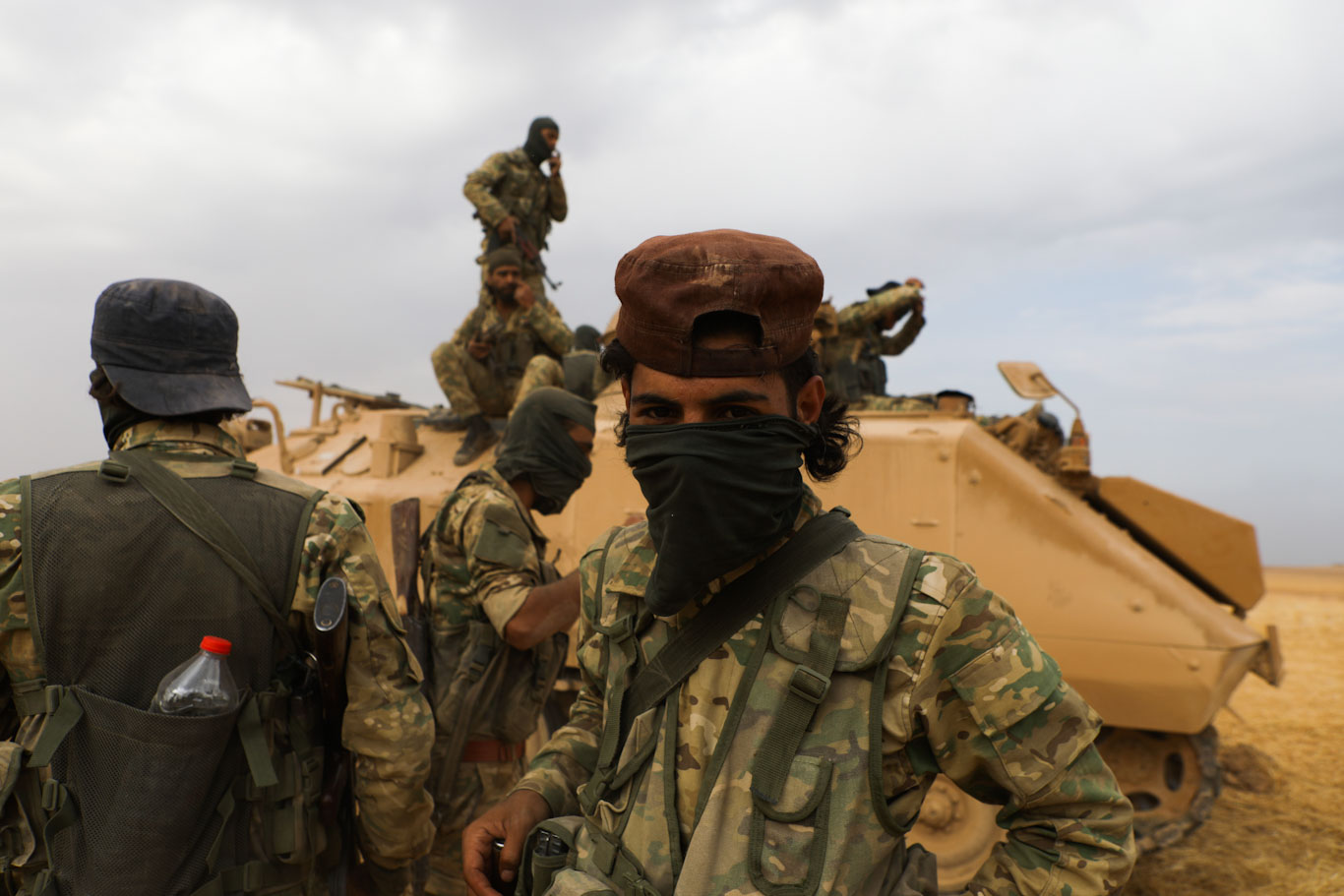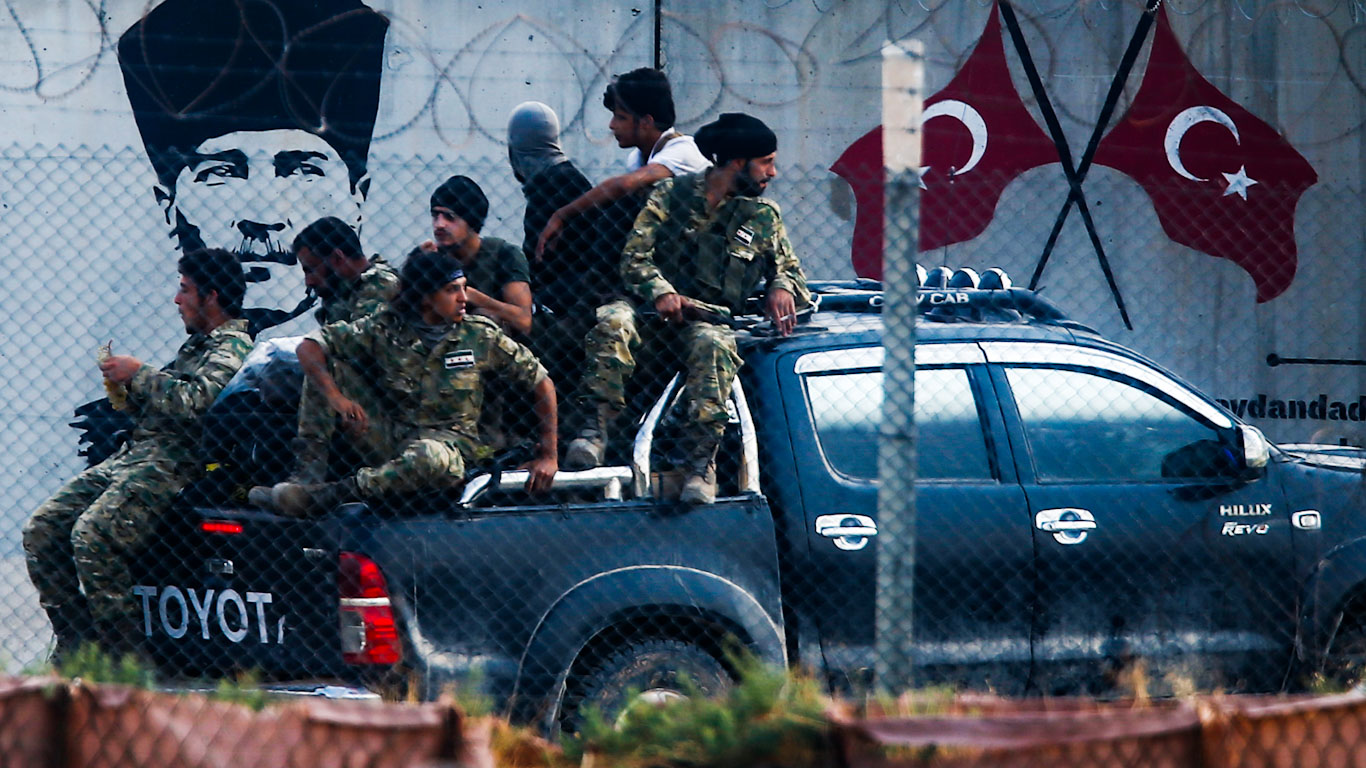Turkey recently threatened to send 1,200 ISIS terrorists back to their countries of origin in the EU, the U.S., and the UK. Turkey’s Interior Minister, Suleyman Solyu, claimed that extradition would begin on Monday, November 11, ironically on Armistice Day. Ankara claimed it would even send back those whose citizenships have been revoked. How Turkey plans to follow through with this threat is another matter. Turkey’s history of both incubating terrorist groups and blackmailing the European Union is well known.
Peter Ford, former UK Ambassador to Syria and Bahrain, had this to say about the Turkish ISIS deadline:
Turkey has manipulated the ISIS phenomenon from its very beginning, just as Pakistani military intelligence facilitated and manipulated the Taliban and Al Qaida. Just as Bin Laden was found under the noses of Pakistani security forces in Pakistan, so Al Baghdadi was found a couple of miles from the Turkish border in an area (Idlib) crawling with Turkish and pro-Turkish militias.”
Given the complexity of the situation, it is important to examine the reasons behind Ankara’s posturing and Turkey’s support for ISIS fighters when they serve Turkish economic and military interests at home and in Syria. Turkey’s interests may or may not overlap with those of the United States at any given moment, but there is a synergy concerning oil interests and Syrian territory-annexation or occupation. Coincidentally, U.S. President Donald Trump also threatened to “drop jihadists” at Europe’s borders if the UK, France, and Germany refused to repatriate ISIS nationals. As Peter Ford told me:
Turkey’s threat to send ISIS prisoners to Europe is simple blackmail: stop whinging about Turkey’s behavior in Syria or we open the floodgates. In reality, Turkey has better uses planned for its ISIS foot soldiers and camp followers.”
No other country neighboring Syria has been so heavily invested in harboring terrorist groups on their territory and providing the porous borders required for the passage of these groups, arms, and equipment into externally-created conflict zones inside of Syria since the war against that country began in earnest in 2011. As Syria’s President Bashar al-Assad said recently, in an interview with Syrian TV and the al-Ikhbarya channel:
…we are in one arena, the whole Syrian arena is one – a single theatre of operations. From the furthest point in the south to the furthest point in the north Turkey is the American proxy in this war, and everywhere we have fought we have been fighting this proxy.”
On November 11, President Assad was interviewed by RT Going Underground, during the interview he pointed out:
Since ISIS started smuggling Syrian oil and looting Syrian Oil in 2014, they had two partners: Erdogan and his coterie, and the Americans, whether the CIA or others. ”
A prison break opportunity for ISIS fighters
October 9, 2019. Turkey launches “Operation Peace Spring,” ostensibly to push Kurdish separatist forces back from its borders with Syria. The move effectively allowed Turkey to take control of two cities, Ras Al Ain and Tel Abyad, where clashes are ongoing between Turkish proxy forces, made up of an assortment of extremist fighters that had previously occupied Idlib and other areas of Syria, and the Syrian Arab Army supported partially by the SDF Kurdish forces previously allied with the U.S. and supported by Israel.
A major beneficiary of this unlawful push into Syrian territory has been ISIS brides along with that followers and fighters that were imprisoned in the notorious Al Hol camp and other ISIS holding camps in the region. These dangerous ideologues see the Turkish incursion as an opportunity to escape their Kurdish captors and for the so-called ISIS brides to reunite with their husbands who are already in Turkey, according to their own testimony. One Russian ISIS bride told Kurdistan 24, a Kurdish media outlet:
We want Turkey to attack here. If the Turkish army comes to this area, I will be able to flee and meet my husband, who I know well is in Turkey.”

In the same interview, a French ISIS bride expressed hope that Ankara would invade the camp and enable their flight to Turkey. Under cover of one particular Turkish airstrike, an alleged 800 ISIS-affiliated individuals managed to escape the Ain Al Issa camp according to the same Kurdish media report.
Perhaps in an effort to justify his perceived abandonment of the Kurds, President Trump tweeted that the Kurds were deliberately releasing ISIS prisoners to draw the U.S. back into the conflict, a claim echoed by Turkish officials who claimed that the Kurds were taking money for releasing ISIS fighters or their families.
….Kurds may be releasing some to get us involved. Easily recaptured by Turkey or European Nations from where many came, but they should move quickly. Big sanctions on Turkey coming! Do people really think we should go to war with NATO Member Turkey? Never ending wars will end!
— Donald J. Trump (@realDonaldTrump) October 14, 2019
When Trump previously floated the idea of withdrawal from Syria in December 2018, the Kurdish contras threatened to release 3,200 ISIS fighters. While Kurdish leaders denied that this had ever been considered, the threat was enough to cause Trump to reel back from withdrawing from Syria.
A recent report from the New York Times claims that Al Hol camp contains some of the most violent and steadfast ISIS supporters, 10,000 women and children from 50 countries, two-thirds of the children under the age of 12. In the report, a woman interviewed in the piece stated that she was committed to bringing back the “caliphate” and that her children were on “God’s path” towards violent extremism.
A report in the Spanish language El Pais, describes a “radical matriarchy” set up to facilitate escape for ISIS followers and overseen by a tyrannical female Emir. According to the report, these female extremists pay upwards of $ 9,000 to “ISIS traffickers” to bribe their SDF guards. El Pais describes the camp as a radicalization and indoctrination center where women and minors are being converted into extremist military cadres willing to persecute those who do not comply with the religious extremism being forced upon the camp’s inhabitants.
Shortly after Ankara’s military operation began, a senior Iraqi security expert, Hafez Al-Basharah, claimed that Washington was attempting to transfer 3,000 ISIS terrorists from Syria to Iraq where they would be transferred to a “safe area.” The U.S. would use the Turkish occupied zones inside Syria as a holding base for the ISIS fighters until their transfer to the three chosen bases inside Iraq.
Various Arabic language media outlets have reported that the United States is planning to produce a Super ISIS — an even more radical, violent version of the group’s previous incarnation. Hessam Sho’aib, a Syrian military expert on terrorist organizations, announced to Sputnik Arabic that various reports from U.S. “think tanks” indicate the heralding in of an ISIS renaissance in Syria and Iraq. The reports, according to Sho’aib, also allude to U.S. intelligence involvement in the birth of ISIS, its apparent demise, as well as its rebirth. A rebirth that would ensure the sustained recycling of terrorism and the perpetual destabilization of the region.
Certainly the U.S. faux withdrawal, the invasion of Turkish extremist proxies, the retreat of SDF prison guards as well as the apparent corruption of the remaining SDF factions in charge of the camps, have all contributed to the latter-day ISIS “Operation Breaking the Walls” which appears to be allowing followers and fighters to regroup, expand and reinforce their military capability on the borders with Syria. At the same time, the ISIS prison break gives Turkey the opportunity to blackmail other NATO member states into ignoring the atrocities and war crimes being committed by the assortment of extremist groups under Ankara’s command inside Syria.
Turkey plays both ends against the middle
The Turkish repatriation of foreign ISIS fighters has already begun, according to a report in Middle East Monitor. One American fighter has already been deported and travel plans are in place for seven German nationals affiliated with the terrorist group. It appears that Turkey’s threat was not idle and that the U.S.-led alliance in Syria may be about to reap what it has sown for the past nine years.

Waseem Ramli, a short-lived Syrian honorary consul representative in Montreal before the multiple neoconservative interests in Trudeau’s government campaigned to have him removed on the pretext of being loyal to the elected and internationally recognized Syrian government, referred to Ankara’s betrayal of their own NATO allies thusly:
For the past years we have been warning the western governments of what may happen if they continue supporting the continuation of the war in Syria but they never expected to be backstabbed by one of their own NATO allies!
Guess we will be seeing these governments scrambling to figure out how to deal with this situation while they continue to refuse to acknowledge that their best option is opening a line of communication with the Syrian government.”
President Assad alluded to Ankara’s strategy in his interview with RT Going Underground:
Actually, the relation between Erdogan and the EU is two ways: they hate him but they want him. They hate him, they know that he is fanatic Islamist, they know this, and they know that he’s going to send them those extremists or maybe terrorists.”
Turkey is essentially playing both ends against the middle. ISIS was first allowed into Syria from Turkey. The Caliphate’s economy was able to flourish, enriched by millions of dollars of oil smuggled into Turkey and sold to Israel. ISIS was the perfect invention to fulfill Erdogan’s neo-Ottoman aspirations of toppling the Syrian government, annexing more Syrian territory, plundering resources, pillaging industry and finally eliminating the PKK Kurdish factions. Former Ambassador Ford asserts that U.S. Coalition policy makers were effectively acting in accordance with Turkey’s Syria policy:
The U.S. knew all this and turned a blind eye. As long as ISIS was advancing towards Damascus, what was not to like? Turkey got a free pass to support a terror group which curiously never mounted a significant attack against the U.S. beyond a few provocative beheadings but which gave the U.S. Coalition a pretext to put forces in Syria.”
Ford also pointed out that ISIS periodically commits atrocities on Turkish soil, conveniently, Ford says, “whenever Turkish assistance and subsidies were reduced for some reason. It appears, as Ford concluded, that “ ISIS was in the mafia protection business after all.”
Indeed, Turkey apparently used the thousands of conveniently collected ISIS prisoners held in Syria as additional manpower to reinforce the ranks of the swiftly rebranded “Syrian National Army,” a cynical attempt to portray former extremists and terrorist groups as a pseudo-nationalist “legitimate liberating force” under Ankara’s command. Ford says that many of the captured ISIS fighters were caught on their way to bolster the ranks of the pro-Turkish FSA and other extremist groups occupying Idlib.
It is no accident that many of the fighters who were caught in the end of days for the Caliphate were on their way to Idlib, to be recycled as pro-Turkish FSA. Or HTS (Hayat Tahrir Ash Sham), the Al Qaeda affiliate, tolerated when not actively assisted by Turkey. So Turkish help in freeing ISIS prisoners is no fanciful conspiracy theory.” (emphasis added)
The move would not be without precedent either, as Turkey allegedly recruited and retrained ISIS fighters to participate in Ankara’s Afrin land grab in February of 2018.
The latest bogeyman in the global terror portfolio
The U.S. Coalition has effectively given Turkey free rein to maneuver and recycle terrorist and extremist factions with impunity in order to achieve its political ambitions in Syria. That campaign has failed miserably, western journalists fleeing the north-east of Syria during the start of the Turkish operation came face to face with the monsters unleashed upon the Syrian people for nine years, by their governments in the West and their allies in the Gulf States and Israel.
Having described these extremist, sectarian gangs as “moderate rebels” for nearly a decade, the media was suddenly confronted by their bloodcurdling brutality and were tripping over their own narratives in their haste to condemn the Turkish proxies for their unbridled aggression against the U.S. and Israeli-backed Kurdish contras, media darlings for the anti-anti-war left in the West and Israel’s partitioning instrument to secure Syrian territory east of the Euphrates.

The irony of the situation is not lost on Waseem Ramli, or indeed upon Peter Ford, who concluded:
Whatever the case, the irony is that Western governments would rather tie themselves in knots than accept the obvious solution which would be adopted automatically if these countries were serious about the ‘international rules-based system’ they preach at others: hand over the jihadis to face Syrian justice. Their crimes were committed on Syrian soil, overwhelmingly against Syrian victims. If a Syrian jihadi committed a crime on British soil, would we not absolutely demand they faced British justice? Instead, we behave like a tinpot dictatorship ourselves, autocratically stripping British citizens of their nationality.”
ISIS is the latest bogeyman in the global terror brand portfolio, serving a neoconservative agenda in the Middle East. Turkey has been the midwife and the curator of this and other terrorist groups on behalf of its NATO allies who are intent upon ushering in a new government in Syria and fomenting regional unrest. In 2017, Dr. Bouthaina Shaaban, the political and media advisor to President Assad, predicted that Erdogan would turn on his former allies. Two years later that prophecy is being fulfilled.
I hope that Europeans will discover who he is before it becomes too late. I mean it. Because two years ago when Merkel came to him to discuss the issue of refugees I said she is coming to the source of the problem. He is the origin of the problem.»
Feature photo | Turkish-backed Syrian fighters on a pick up truck, drive past a graffiti of modern Turkey’s founder Mustafa Kemal Ataturk as they cross the border between Turkey and Syria, in Akcakale, Sanliurfa province, southeastern Turkey, Oct. 17, 2019. Emrah Gurel | AP
Vanessa Beeley is an independent journalist and photographer who has worked extensively in the Middle East — on the ground in Syria, Egypt, Iraq and Palestine, while also covering the conflict in Yemen since 2015. Please support her work at her Patreon Page.


